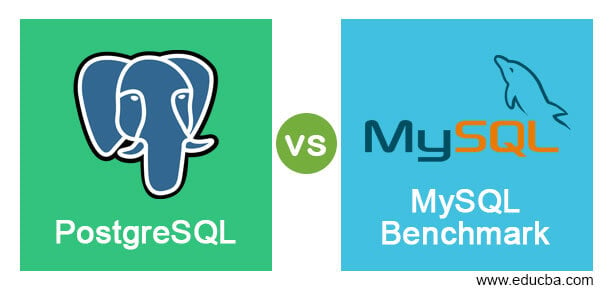Updated May 30, 2023

Difference Between PostgreSQL vs MySQL Benchmark
The following article provides an outline for PostgreSQL vs MySQL Benchmark. The speed disparities between MySQL and Postgres have already been largely eliminated in modern updates. The data security and transactional processing support that comes with the newest version of MySQL can be highly beneficial to any organization, mainly if it is an eCommerce firm with frequent currency transactions.
What is PostgreSQL?
PostgreSQL is well-suited to complicated tasks and concurrency and ensures data integrity, although it is expensive for read-intensive activities. The significant cloud service providers, namely Amazon, Google, and Microsoft are on board. Within PostgreSQL, create and distinguish among one and many-to-many associations.
Code:
UPDATE name SET segment = "mainhello" WHERE age > 20; Here everything is case sensitive.What is MySQL Benchmark?
MySQL Workbench is an Oracle-developed visual tool for administering MySQL databases. Being a cross-platform programme, MySQL works well on a variety of operating systems, including Windows, Linux, and Mac OS X. MySQL Workbench includes information modeling, SQL creation, and various configuration tools. It also has a graphical user interface that systematically lets you deal with databases. For example, using MySQL Workbench, one can develop a Statistical Approach and handles Structured data. MySQL is built for speed and dependability at the price of strict conformance to SQL rules.
Code:
UPDATE name SET segment = "mainhello" WHERE age > 20; Sql Benchmark is not case sensitive.Neither MySQL nor PostgreSQL has always had an adequate log monitoring program. As a result, extracting meaningful intelligence from the built-in logs is a chore. A relational database management system handles a popular and simplest database with memory usage, disc, and CPU consumption (RDMS). MySQL Community Edition is a free download backed by a vibrant online community.
Head-to-Head Comparison Between PostgreSQL vs MySQL Benchmark (Infographics)
Below are the top 8 differences between PostgreSQL vs MySQL Benchmark:
Key Difference Between PostgreSQL vs MySQL Benchmark
Let us discuss some of the primary key differences between PostgreSQL vs MySQL Benchmark:
- MySQL has a reputation for being a lightning-fast database for read-intensive applications at the expense of concurrency.
- MySQL benchmark is feature-light, allowing it to rely on high speed and dependability, making it ideal for sites and internet payments. Still, PostgreSQL is suitable for more complex analytical operations.
- The PostgreSQL International Development group created PostgreSQL, offered below as an open-source license equivalent to the MIT license. MySQL’s source code is available to the general public under the GNU license and some private contracts. However, Oracle Corp. now owns it, and it must provide a variety of charged commercial versions.
- PostgreSQL is unique because it is Object-Relational, ACID-compliant, NoSQL-compatible, and highly concurrent.
- Table partitioning and function overloading are features of PostgreSQL, and it manages concurrency better on average. Conversely, SQL is suitable for more straightforward applications and generally utilizes more storage.
- Although PostgreSQL supports JSON objects, which allows users to emulate MongoDB functionality, We would say that the SQL benchmark is far more sophisticated and, in many circumstances, far better to handle than NoSQL databases.
- The most well-known massive data system is MySQL, an Oracle-backed RDBMS. It is an open-source operating system that powers many web apps and websites. It’s simple to set up and requires only minor fine-tuning to produce good results. However, because of its sophisticated underlying technology, PostgreSQL has become the preferred option for organizations that execute advanced and high data processes.
Comparison Table Between PostgreSQL vs MySQL Benchmark
Let us discuss some of the comparisons between PostgreSQL vs MySQL Benchmark:
|
|
PostgreSQL |
MySQL Benchmark |
| Definition | PostgreSQL is a relational database management system. It organizes data into rows, having columns representing various data properties. A table is a collection of connected rows. | MySQL Workbench is a visual database management system and modeling tool for the MySQL database engine server. It makes creating new physical data models easier to make changes to existing MySQL databases. |
| Usage | Several web, mobile, geospatial, and advanced analytics utilize PostgreSQL as their primary data storage or data warehouse. | MySQL Workbench is a MySQL server application framework. Database design & development, SQL implementation, and server management are all included. |
| Type System | Extensible is supported here. | MySQL doesn’t support it. |
| Troubleshoot | PostgreSQL is a difficult database to troubleshoot. | MySQL is simple to diagnose since it has a friendly and helpful community. |
| Data Compression | Lacking data compression. | Has data compression. |
| Cost | Free of cost. | Has got a few prepaid plans. |
| Cloud compatible | Yes | Yes |
| Performance | Postgres outperforms by default because it supports parallel writing processes without needing reading/write locks. It also supports transaction isolation and snapshots and therefore is fully ACID compliant. | On the other hand, MySQL seeks to achieve concurrency by employing write locks. As a result, the number of concurrent activities per task is reduced. And have to add a lot of resources to MySQL to scale production systems. |
While the two databases have numerous parallels and similarities, they also have significant variances. Therefore, even if we have thoroughly compared the two, in the final, one must examine the personal case and pick whichever database is better suited for business needs.
Conclusion
PostgreSQL and MySQL have advantages and disadvantages, but knowing which features are best for a project and incorporating those features will result in improved speed. PostgreSQL can be readily linked with many technologies if we wish to go to a more complicated and customized system.
Recommended Articles
We hope that this EDUCBA information on “PostgreSQL vs MySQL Benchmark” was beneficial to you. You can view EDUCBA’s recommended articles for more information.

